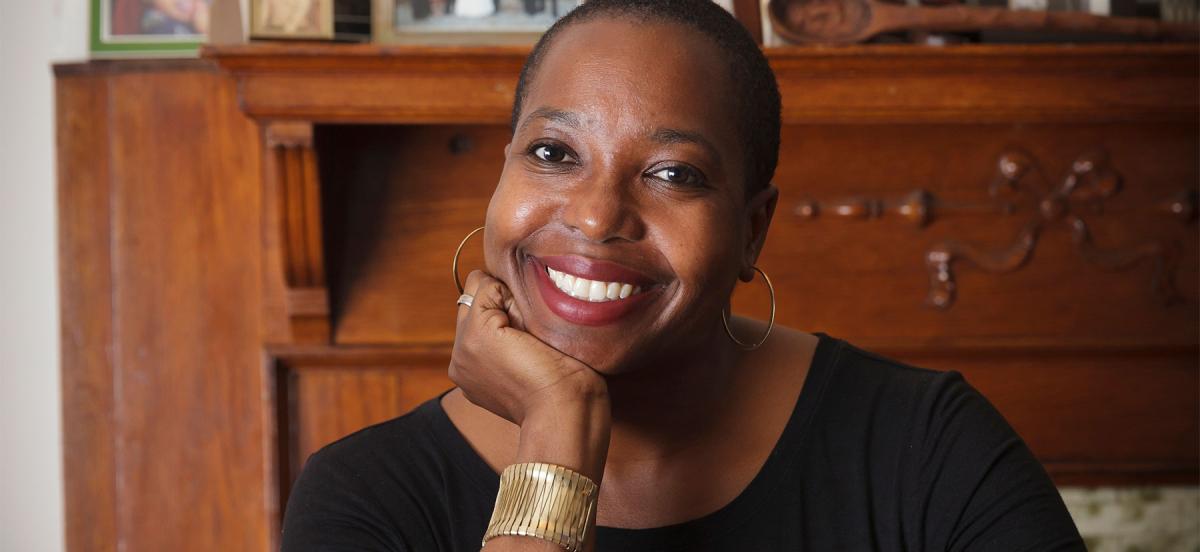Five Questions With Asali Solomon

Associate Professor of English and Creative Writing Program Director Asali Solomon's latest novel, The Days of Afrekete, features two characters who were lovers as students at Bryn Mawr College. Photo by Dan Z. Johnson.
Details
The associate professor of English and creative writing program director discusses her latest novel, The Days of Afrekete, its Philadelphia setting, and Bi-Co alumnae characters.
The new novel by Associate Professor of English and Creative Writing Program Director Asali Solomon, The Days of Afrekete, centers on a dinner party hosted by Liselle, a Black woman married to a white politician who has just lost an election and who is being investigated by the FBI. Feeling increasingly estranged from her privileged life, before the party begins Liselle leaves a phone message for Selena, her lover when they were Bryn Mawr students two decades earlier. The story of their affair, the choices Liselle went on to make, and the very different path Selena’s life has taken are at the center of a novel a New York Times review called “a reverie, a riff on Mrs. Dalloway and a love story,” one whose central character, Liselle, “comes to the mind’s eye in HD, with anxieties, jokes, memories, furies and survival instincts all present in prose as clear as water.”
Why did you choose Bryn Mawr as the alma mater for the main characters in the book?
Asali Solomon: The answer is fairly pragmatic. I wanted to set those scenes at a women’s college, and I also wanted to set them near Philadelphia. Bryn Mawr also offered itself as a place that I could easily imagine because I spend time there now. It’s also somewhere that I believe had a pretty strong lesbian community in the years during which the novel is set.
Like your novel Disgruntled and your short story collection, this novel is also set in your hometown. What about Philadelphia draws you to it as a setting?
AS: At first, I wrote about Philadelphia because the further and longer I strayed from it, the more I thought about it. I think it is not until you leave your home that you realize what is particular about it. But then, as I read the stories of Edward P. Jones, who writes about Washington, D.C., I began to think about how much I liked the idea of mythologizing Philadelphia. It makes me feel grounded in my writing and offers something special to people who are from Philadelphia. I think also, with the rapid progress of gentrification, the writing becomes a time capsule of a moment when a lot of big cities had much larger and varied Black populations than they may at some future moment.
Is there a throughline that runs through your work? Are there ideas or issues that work their way into everything you write?
AS: When I began writing, I really wanted to depict scenes of Black life that I hadn’t encountered in fiction before—particular scenes of intra-racial dynamics, class difference, the riches of Black talk and habits, the awkwardness of youth (back then not often encountered in mainstream culture outside of [the Family Matters TV character] Steve Urkel). When I think about it, I guess all of that continues up to the moment. The other thing that I guess I’m always writing about is music and parties, even if I don’t set out to do so. This likely comes from the fact that when I first began writing (as an adult, mind you), I was trying to exorcise demons from middle school dances at prep school.
In your recent piece in Bookforum you mentioned a reviewer calling your main characters “problematic.” Do you need to like your characters to write about them?
AS: I don’t think you have to like your characters! You don’t have to even really root for them, and you certainly shouldn’t try to keep them from harm. I think you have to understand them, and above all, you have to be interested in what happens to them. Otherwise, you won’t make anything interesting happen. I feel neutral about Selena and Liselle in terms of like/dislike, but I’m deeply invested in them. I understand what animates them. But I love Chris the pastor, and I love Liselle’s mother, Verity. That’s the dinner party I’d go to.
The novel has been called a "social satire." Is that how you would describe it? Is that what you set out to write from the beginning?
AS: Satire involves using humor to make social and political commentary. This novel certainly does that—as does all of my fiction. But while it has satirical elements, I have not written a full-fledged satire yet, though it is a life goal.



